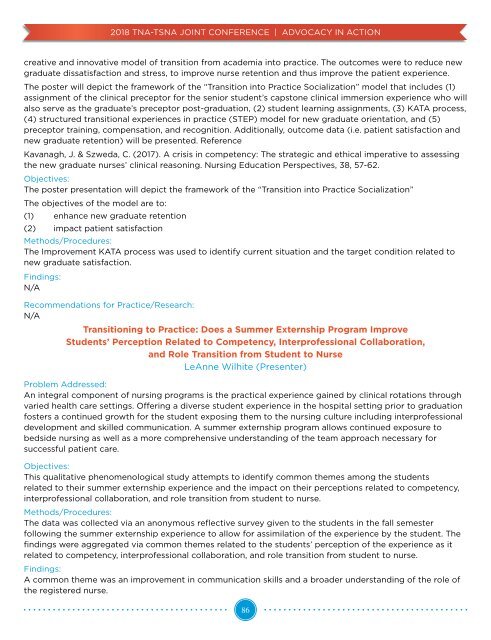2018 TNA and TSNA Joint Annual Conference
Create successful ePaper yourself
Turn your PDF publications into a flip-book with our unique Google optimized e-Paper software.
<strong>2018</strong> <strong>TNA</strong>-<strong>TSNA</strong> JOINT CONFERENCE | ADVOCACY IN ACTION<br />
creative <strong>and</strong> innovative model of transition from academia into practice. The outcomes were to reduce new<br />
graduate dissatisfaction <strong>and</strong> stress, to improve nurse retention <strong>and</strong> thus improve the patient experience.<br />
The poster will depict the framework of the “Transition into Practice Socialization” model that includes (1)<br />
assignment of the clinical preceptor for the senior student’s capstone clinical immersion experience who will<br />
also serve as the graduate’s preceptor post-graduation, (2) student learning assignments, (3) KATA process,<br />
(4) structured transitional experiences in practice (STEP) model for new graduate orientation, <strong>and</strong> (5)<br />
preceptor training, compensation, <strong>and</strong> recognition. Additionally, outcome data (i.e. patient satisfaction <strong>and</strong><br />
new graduate retention) will be presented. Reference<br />
Kavanagh, J. & Szweda, C. (2017). A crisis in competency: The strategic <strong>and</strong> ethical imperative to assessing<br />
the new graduate nurses’ clinical reasoning. Nursing Education Perspectives, 38, 57-62.<br />
Objectives:<br />
The poster presentation will depict the framework of the “Transition into Practice Socialization”<br />
The objectives of the model are to:<br />
(1) enhance new graduate retention<br />
(2) impact patient satisfaction<br />
Methods/Procedures:<br />
The Improvement KATA process was used to identify current situation <strong>and</strong> the target condition related to<br />
new graduate satisfaction.<br />
Findings:<br />
N/A<br />
Recommendations for Practice/Research:<br />
N/A<br />
Transitioning to Practice: Does a Summer Externship Program Improve<br />
Students’ Perception Related to Competency, Interprofessional Collaboration,<br />
<strong>and</strong> Role Transition from Student to Nurse<br />
LeAnne Wilhite (Presenter)<br />
Problem Addressed:<br />
An integral component of nursing programs is the practical experience gained by clinical rotations through<br />
varied health care settings. Offering a diverse student experience in the hospital setting prior to graduation<br />
fosters a continued growth for the student exposing them to the nursing culture including interprofessional<br />
development <strong>and</strong> skilled communication. A summer externship program allows continued exposure to<br />
bedside nursing as well as a more comprehensive underst<strong>and</strong>ing of the team approach necessary for<br />
successful patient care.<br />
Objectives:<br />
This qualitative phenomenological study attempts to identify common themes among the students<br />
related to their summer externship experience <strong>and</strong> the impact on their perceptions related to competency,<br />
interprofessional collaboration, <strong>and</strong> role transition from student to nurse.<br />
Methods/Procedures:<br />
The data was collected via an anonymous reflective survey given to the students in the fall semester<br />
following the summer externship experience to allow for assimilation of the experience by the student. The<br />
findings were aggregated via common themes related to the students’ perception of the experience as it<br />
related to competency, interprofessional collaboration, <strong>and</strong> role transition from student to nurse.<br />
Findings:<br />
A common theme was an improvement in communication skills <strong>and</strong> a broader underst<strong>and</strong>ing of the role of<br />
the registered nurse.<br />
86

















